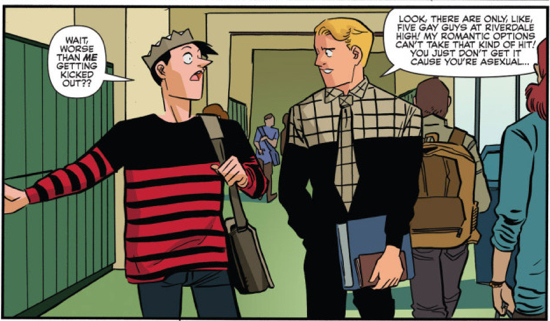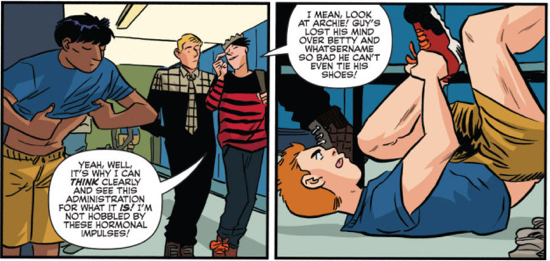Martha Thomases: Jughead’s Sex Life
 This column is going to make me sound old. Really really really old.
This column is going to make me sound old. Really really really old.
In the new issue of Jughead by Chip Zdarsky and Erica Henderson, Jughead comes out as asexual. As I write this, it hasn’t yet appeared on the stands, but I’ve loved the series so far and I’m really looking forward to it. Still, the news sent me on a tour of the Internet to exciting new avenues of political correctness.
(Note: I want to be politically correct here. I am trying to understand people who are new to me, and I want to be polite and respectful.)
The first thing I found out is that this isn’t even really news. Comicbook.com had the story way back on September 25. My first reaction was surprise that this didn’t show up on any of my feeds at that time. My second reaction was admiration for Archie’s publicist for getting two hits with the story.
The next thing I learned is that I didn’t really understand what asexual meant. I thought it just meant a person who wasn’t interested in sex. I was wrong. If you read the link (and it’s fascinating), you’ll see that identifying as asexual is much more complicated than my initial assumption.
As most things are.
 Living life and meeting people is the easiest and most fun way to have one’s assumptions challenged. When I was a kid, society told me that homosexuality was a perversion indulged in by people who were too immature to form meaningful relationships. I learned differently when I met actual gay and lesbian people. Society told me that sex was only for reproduction, and that it was something only men liked, something that good girls only did so they could have babies. I learned differently when my own hormones kicked in, and feminism became a thing. Society told me that transgender people had extreme cases of body dysmorphia. This is a case where society not only told me the wrong thing, but actual science has made it possible for there to be emotionally healthy alternatives to “just learning to live with it.”
Living life and meeting people is the easiest and most fun way to have one’s assumptions challenged. When I was a kid, society told me that homosexuality was a perversion indulged in by people who were too immature to form meaningful relationships. I learned differently when I met actual gay and lesbian people. Society told me that sex was only for reproduction, and that it was something only men liked, something that good girls only did so they could have babies. I learned differently when my own hormones kicked in, and feminism became a thing. Society told me that transgender people had extreme cases of body dysmorphia. This is a case where society not only told me the wrong thing, but actual science has made it possible for there to be emotionally healthy alternatives to “just learning to live with it.”
And just in researching this column, I found out about skoliosexuals, about whom I was completely ignorant. I look forward to maybe meeting some and having even more of my assumptions shattered.
At the same these changes in social attitudes happened, comic books grew up. My childhood was filled with stories about Lois Lane wanting Superman to give her a “super-kiss.” Characters might wear revealing costumes, but they were all chaste. It wasn’t until underground comix, and then the direct market, that a mass market saw comic book characters who had adult relationships with adults.
(Note: Yes, it is my opinion that an awful lot of comic books are still smarmy and giggly about sex. So are most humans. Alas.)
This week, we’re seeing a comic book character who is shocking because of his lack of interest in sex. He is being written (I think, based on the few pages I’ve seen) respectfully, as a character, not a caricature like Sheldon Cooper on The Big Bang Theory.
(Is Sheldon supposed to be asexual? Or is he supposed to just be really repressed? Or don’t the writers even think about such things when all they want is a laugh?)
As an old person, I find myself looking at Jughead indulgently, thinking that as a teenager, his sexuality is probably at its most fluid, and that he might just be going through a stage.
And then I realize what I sound like, and try to shut up.











